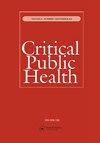不健康饮食的途径。对低收入家庭男女日常饮食习惯的调查
IF 2.3
3区 医学
Q2 PUBLIC, ENVIRONMENTAL & OCCUPATIONAL HEALTH
引用次数: 1
摘要
摘要饮食健康是卫生政策和关于健康与不平等的公共辩论的一个重要主题。饮食健康的社会梯度是明显的,但人们对低社会经济地位人群在日常生活中形成不太健康饮食的过程知之甚少。在这项混合方法研究中,我们招募了30名居住在丹麦低收入家庭的男性和女性,并将关于家庭实践的定性访谈与对参与者饮食质量的定量估计相结合。定性研究结果表明,总体而言,参与者的饮食习惯受到预算限制的制约,并与日常生活中的其他非饮食习惯捆绑在一起,在大多数情况下,但并非所有情况下,这与健康饮食相冲突。只有少数参与者表示能够根据自己的喜好提供“合适的食物”。我们确定了五种不同的食物实践途径。所有这些都是由不同的生活环境构成的,这些生活环境创造了食物实践与其他实践捆绑在一起的不同方式。对参与者饮食的定量估计表明,没有一个参与者的饮食被归类为健康。综合分析表明,估计的饮食质量在五种途径之间存在差异,预算限制的程度和家庭中处理疾病的做法对食品做法的表现尤为重要。本文章由计算机程序翻译,如有差异,请以英文原文为准。
Pathways of less healthy diets. An investigation of the everyday food practices of men and women in low income households
ABSTRACT Dietary health is a key theme of health policy and public debates on health and inequality. The social gradient in dietary health is evident, but less is known about the processes in everyday life through which less healthy diets are shaped among people with low socio-economic status. In this mixed methods study we recruited 30 men and women living in low income households in Denmark and combined qualitative interviews about household practices with quantitative estimates of the quality of participants’ diets. The qualitative findings show that in general, the participants’ food practices were conditioned by budget restrictions and bundled with other non-food practices in their everyday life, which in most, but not all, cases conflicted with engagement in healthy eating. Only few participants reported feeling able to provide ‘proper foods’ according to their own preferences. We identified five distinct pathways through which food practices were performed. All were structured by distinct life situations which created different ways in which food practices were bundled with other practices. The quantitative estimates of participants’ diets show that none of the participants’ diets categorized as healthy. The combined analysis showed that estimated dietary quality varied between the five pathways, and that the degree of budget restraint and the practice of handling a disease in the household were notably important for the performance of food practices.
求助全文
通过发布文献求助,成功后即可免费获取论文全文。
去求助
来源期刊

Critical Public Health
Multiple-
CiteScore
5.90
自引率
7.10%
发文量
36
期刊介绍:
Critical Public Health (CPH) is a respected peer-review journal for researchers and practitioners working in public health, health promotion and related fields. It brings together international scholarship to provide critical analyses of theory and practice, reviews of literature and explorations of new ways of working. The journal publishes high quality work that is open and critical in perspective and which reports on current research and debates in the field. CPH encourages an interdisciplinary focus and features innovative analyses. It is committed to exploring and debating issues of equity and social justice; in particular, issues of sexism, racism and other forms of oppression.
 求助内容:
求助内容: 应助结果提醒方式:
应助结果提醒方式:


